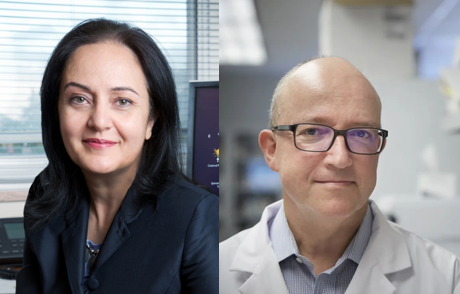Mobile Menu
- About Us
- Divisions
- Education
- Research
- Programs
- Faculty
- News & Events
- Contact Us
- Training Opportunities

Dear Colleagues,
Please join me in congratulating Drs. Mojgan Hodaie and Michael Tymianski who have recently been named as fellows of the Canadian Academy of Health Sciences (CAHS).
Dr. Mojgan Hodaie is a Professor in the Department of Surgery, University of Toronto and the Greg Wilkins-Barrick Chair in International Surgery at the University Health Network. Dr. Hodaie’s scientific research focuses primarily on advanced methods of MRI imaging in functional neurosurgery. She has published key papers focusing on brain microstructural changes in trigeminal neuralgia. Her most recent body of work includes the addition of artificial intelligence techniques to advance the understanding of trigeminal neuralgia, focusing on analyzing medical imaging data and identifying structural and functional changes in the brain associated with this condition. Through this computational approach, Dr. Hodaie has contributed to the identification of biomarkers enhancing the precision of diagnosis, and treatment options for neuropathic pain.
Dr. Hodaie is currently serving as Secretary of the World Society for Stereotactic and Functional Neurosurgery and oversees a number of surgical education initiatives, exploring the role of technological advances to deliver surgical education, locally and internationally.
Dr. Michael Tymianski is a Senior Scientist and a retired neurosurgeon, Toronto Western Hospital Research Institute, a Professor, Department of Surgery, University of Toronto, and a Canada Research Chair (Tier 1) in Translational Stroke Research. His most advanced contribution relates to the development of PSD95 inhibitors, ranging from the discovery that PSD95, and abundant synaptic protein is therapeutic target for neurodegeneration (Sattler et al., Science, 1999).
By 2002, he developed a drug, now termed “nerinetide”, that inhibits PSD95 and reduces ischemic brain damage in rats (Aarts et al, Science, 2002). This finding has been reproduced by several investigators worldwide. Over the next decade, the Tymianski lab focused on translating NA-1 to the point of clinical utility through extensive target validation (Cui et al, J Neurosci, 2007), testing in rodent models (Sun et al., Stroke, 2008) and, ultimately, in primate models of stroke (Cook et al., Nature, 2012; Cook et al., Science Translational Medicine, 2012).
In 2012, Tymianski and his team published the first clinical trial supportive of neuroprotection by nerinetide in humans (Hill et al., Lancet Neurology, 2012). Two phase 3 trials of NA-1 have been conducted in patients selected for endovascular thrombectomy (ESCAPE-NA1 and ESCAPE-NEXT), and another in patients with suspected stroke treated in the pre-hospital setting (FRONTIER; NCT02315443). Nerinetide and its follow-on analogs continue to be investigated for AIS.
You can read more about all of the U of T community members who were named as fellows of CAHS this year in this article: https://www.utoronto.ca/celebrates/thirteen-u-t-researchers-named-fellows-canadian-academy-health-sciences
Congratulations Dr. Hodaie and Dr. Tymianski on this achievement. Your colleagues at the Department of Surgery are proud of your work and of your involvement with CAHS, which will have an impact on key issues relevant to the health of Canadians.
Sincerely,

Carol J. Swallow MD PhD FRCSC FACS
RS McLaughlin Professor and Chair
Department of Surgery, University of Toronto
